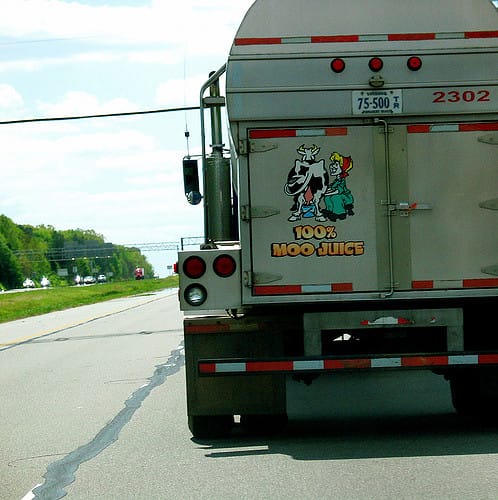It’s bad enough that the only legal obligations corporations have are to their shareholders and investors. Many companies and brands talk a good game when it comes to “sustainability” practices, but, as this commentary illustrates, their very model is destructive.
In the case of Aurora, not only will they have semi-trailers worth of raw milk coming in from Texas and Colorado (where their corporate-owned mega-dairies are located), they will be shipping truckloads full of packaged milk, from Columbia, Missouri, to Portland, Oregon and Portland, Maine — undercutting the livelihoods of family-scale dairy farmers around the country and their regional processing/marketing partners who deliver to stores within a couple hundred miles rather than thousands.
Aurora’s entire model, in terms of environmental stewardship, is anything but “organic.” It is a gross betrayal to the values of the farmers, entrepreneurs, and consumers who have built the organic movement (which Aurora and its investors are all too happy to exploit).
– Mark A. Kastel, Senior Farm Policy Analyst
KEN MIDKIFF: Aurora Organic Dairy an example of unintended consequences
The Missourian
by Ken Midkiff
 |
President Dwight Eisenhower was responsible for creating the Interstate Highway System. He did it to expedite troop movements. Recently, we traveled on Interstate 70 and Interstate 25 to and from Fort Collins, Colorado. We saw absolutely no military vehicles. Instead, there were many 18-wheel trucks and even more passenger cars and SUVs.
What President Eisenhower did was create a system that enables civilian travel and has little or nothing to do with troop movements. His unintended consequence in creating the Interstate Highway System for the military inadvertently benefited the military very little and benefited commercial and non-commercial travel considerably. Also unintended was the increase in global greenhouse gas emissions from all those cars and trucks.
Such is the case locally. The Regional Economic Development Inc. folks worked for months to bring a processing plant for Aurora Organic Dairy here, and there is little doubt that construction jobs were created and, when the plant is fully operational, other high-paying jobs (the company says 100) will exist.
However, there is a downside, and one that the Columbia City Council — which ultimately granted approval of the AOD proposal — did not intend. When President Donald Trump opted out of the Paris Treaty/Agreement on Climate Change, Mayor Brian Treece joined with a large number of other cities’ mayors and agreed to do what President Trump would not do. One of the main points was reduction of greenhouse gases, such as carbon dioxide.
The CEO of Aurora Organic Dairy said no large organic dairy would be established in Missouri and that, initially, milk would come from the company’s operations in Colorado. Now we learn that the company will build a large dairy somewhere in Nebraska.
Whether the milk tankers come from Colorado or Nebraska, the tank trucks — which have a capacity of about 7,000 gallons — rely on diesel engines, which are notoriously “dirty.” The Columbia plant will process and package about 35,000 gallons per day. That’s a lot of tank trucks and a lot of emissions. Not only that, but the trucks will go back to Colorado or Nebraska. Granted, an empty load means that the emissions will be less, but emissions are emissions.
Neither REDI nor the City Council intended this, but this is a consequence of their actions. This consequence flies in the face of Mayor Treece’s actions. Just as President Eisenhower had every good reason to create the Interstate Highway System. Unintended consequences are just that.
Ken Midkiff, formerly the director of the Sierra Club Clean Water Campaign, is now chair the city’s Environment and Energy Commission and serves on the board of directors of the Great Rivers Environmental Law Center.

